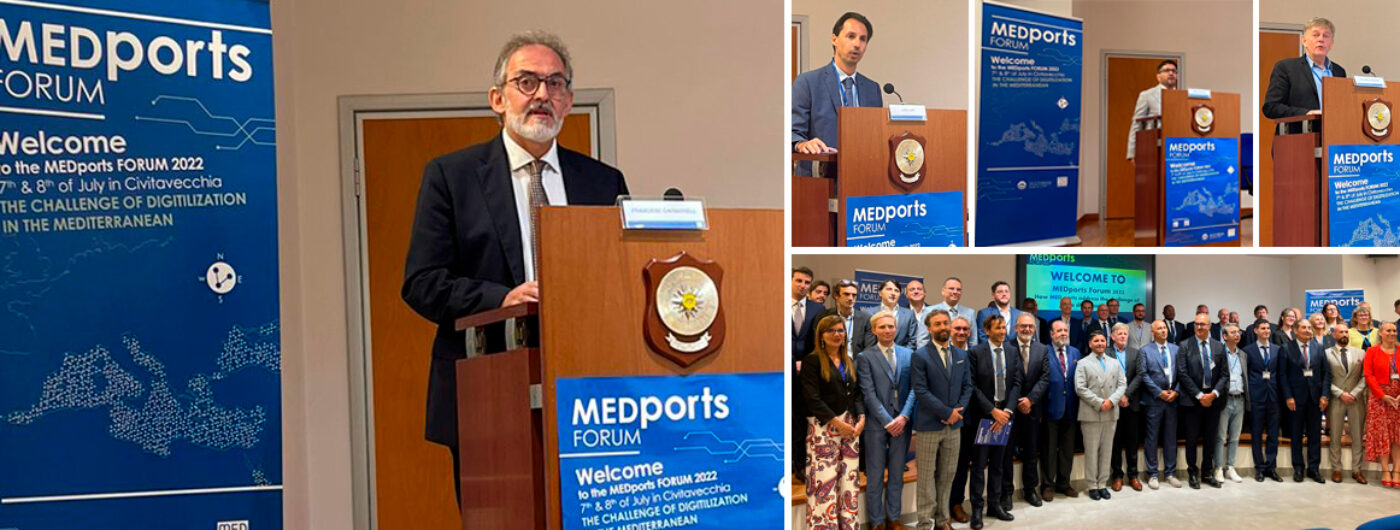
Digitalization challenges and opportunities for Mediterranean ports: towards a more sustainable and resilient shipping industry in the region
Civitavecchia, 7-8 July 2022. The MEDports Forum 2022: The Challenge of Digitalisation in the Mediterranean, was held in Civitavecchia, Italy on 7 and 8 July 2022. The Forum was co-organized by the MEDports Association and the Port System Authority of Central Northern Tyrrhenian Sea – Port of Civitavecchia, and co-sponsored by the Union for the Mediterranean.
For several years now, and especially since the beginning of the Covid-19 crisis, digitalisation has emerged as one of the key drivers for the development of a more sustainable and resilient global shipping industry. Widespread awareness of climate change, the need for greater safety and security in port operations but also the race for greater logistical efficiency, have led to the emergence of many digital-related initiatives and projects around the world. As a maritime space connecting three continents and a true crossroads of international trade, the Mediterranean is at the heart of this digital revolution.
This edition of the annual gathering examined the state of the art of digitalization in the Mediterranean, its challenges and key success factors. It provided a valuable opportunity to exchange knowledge and best practices among representatives of the international institutions, including the World Bank and IAPH, experts of maritime transport and port activities, and leading port members, in order to assist Mediterranean ports in building a resilient, progressive, and vibrant maritime sector through the use of digitalization.
Francesc Carbonell, UfM Head of Sector for Transport participated in the Opening Session alongside Lionel Rivière, Director of Heritage Development and Innovation of the Port of Marseille Fos, Ernesto Tedesco, Mayor of Civitavecchia, Filippo Marini, Harbour Master of the Port of Civitavecchia and Pino Musolino, CEO of the Port System Authority of the Central Northern Tyrrhenian Sea.
During his opening address, UfM Head of Sector for Transport Francesc Carbonell, commended the organizers for dedicating this Forum, which is a major meeting point for the entire port sector in the Mediterranean region, to discuss such relevant and timely theme. He stressed the importance of this event for the UfM since cooperation, policy dialogue and exchange of best practices on ports, maritime transport and logistics also lie at the heart of the UfM’s mandate.
In view of the upcoming 3rd UfM Ministerial Conference on Transport to be held in Cairo, Egypt on 3 October this year, Francesc Carbonell highlighted one of the key deliverables, the new Regional Transport Action Plan for the Mediterranean region 2021- 2027 (RTAP). Emphasising the engagement of the regional countries in drawing out the new RTAP, he added that the UfM hopes that it will guide the Mediterranean countries’ individual and collaborative efforts in the transport sector in the region in the years to come, also in terms of responding to the challenges and support the opportunities of digitalization.
UfM Head of Sector Francesc Carbonell also noted that, as part of the thinking process about the implementation of the RTAP, the UfM hopes to involve as many partners and stakeholders as possible in this important endeavour, including the organisations and governments participating in the MEDports Forum.
MEDports Association
The MEDports Association, a long-time partner of the UfM in the field of transport, gathers 24 major Mediterranean ports representing about 70% of the total traffic in the Mediterranean.
Its goals are to enhance co-operation between member ports to face new international logistics and commercial challenges, and highlight the pivotal position and importance of the Mediterranean in new global cargo flows.
The MEDports Association also aims to facilitate the creation of new maritime trade links between ports affiliated to MEDports by enhancing the exchange of data and by collaborating in the implementation of sustainable, secure and efficient transport corridors; promote and support interests of MEDports’ members before international organizations and institutions; and study problems relating to port activities and/or port and maritime sector in the context of international treaties or regulations with a focus on impacts on the Mediterranean.

